the widow’s guide to dead bastards
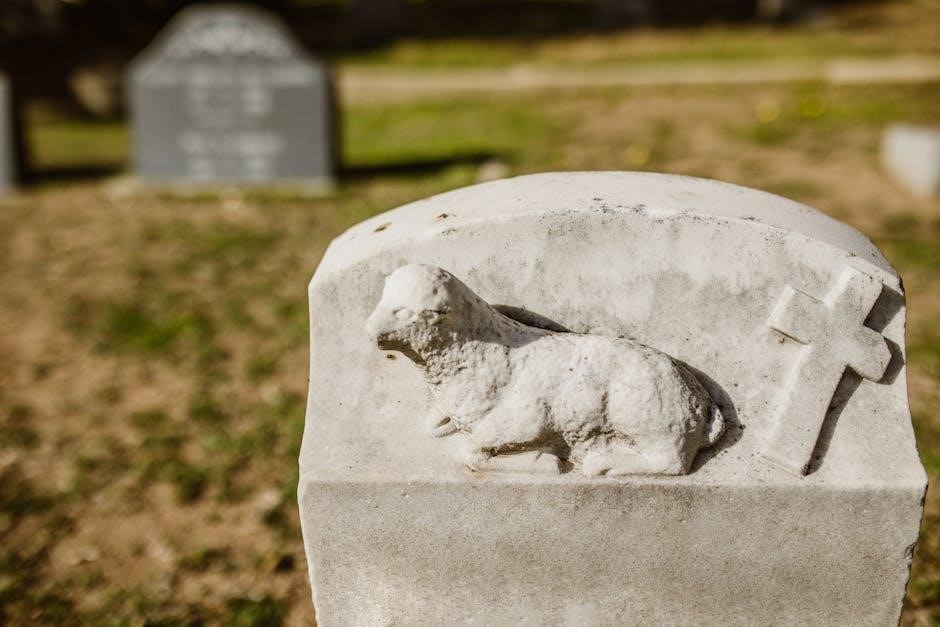
Jessica Waites’ memoir, The Widow’s Guide to Dead Bastards, is a raw, lyrical exploration of grief, mental health, and single parenthood after her husband’s sudden death.
Overview of the Book
The Widow’s Guide to Dead Bastards by Jessica Waites is a riveting memoir that navigates the aftermath of her husband’s unexpected death. It blends raw emotion with a lyrical exploration of grief, mental health, and single parenthood. The book chronicles her journey through shock, bereavement, and the struggle between revenge and forgiveness. Part survival guide, part personal narrative, it offers a candid look at the challenges of widowhood and the resilience required to rebuild life. With unflinching honesty, Waites captures the complexity of loss and the unexpected beauty that can emerge from darkness.
Importance of the Topic
The Widow’s Guide to Dead Bastards tackles universal themes of grief, mental health, and resilience, offering a deeply personal yet relatable exploration of widowhood. Its unflinching portrayal of loss and recovery highlights the often overlooked challenges faced by widows, particularly single parents. By addressing these issues with raw honesty, the book fosters empathy and understanding, encouraging open conversations about bereavement and mental wellness. Its blend of personal narrative and survival guide makes it a vital resource for those navigating similar struggles, emphasizing the importance of healing and growth in the face of tragedy.

Author’s Background
Jessica Waites, the author of The Widow’s Guide to Dead Bastards, gained recognition for her candid memoir detailing her husband’s sudden death and her journey through grief.
Personal History of the Author
Jessica Waites, author of The Widow’s Guide to Dead Bastards, experienced a life-altering event with her husband’s unexpected death. This tragedy reshaped her perspective on life, love, and resilience. Her personal history, marked by sudden loss, deeply influences her writing, offering a raw yet hopeful narrative. Jessica’s journey through grief and single parenthood is central to her memoir, which resonates with readers facing similar challenges. Her story is a testament to the strength found in vulnerability and the power of sharing one’s truth.
Writing Style and Approach
Jessica Waites’ writing in The Widow’s Guide to Dead Bastards is raw, sincere, and deeply personal, blending narrative storytelling with unflinching emotional honesty. Her lyrical prose captures the complexity of grief, mental health, and single parenthood, creating a narrative that is both intimate and universally relatable. Waites’ approach is unapologetic, weaving dark humor with poignant reflections, offering readers a unique lens through which to view her journey. Her voice is both vulnerable and resilient, making her memoir a compelling and thought-provoking read that balances raw emotion with hopeful insight.
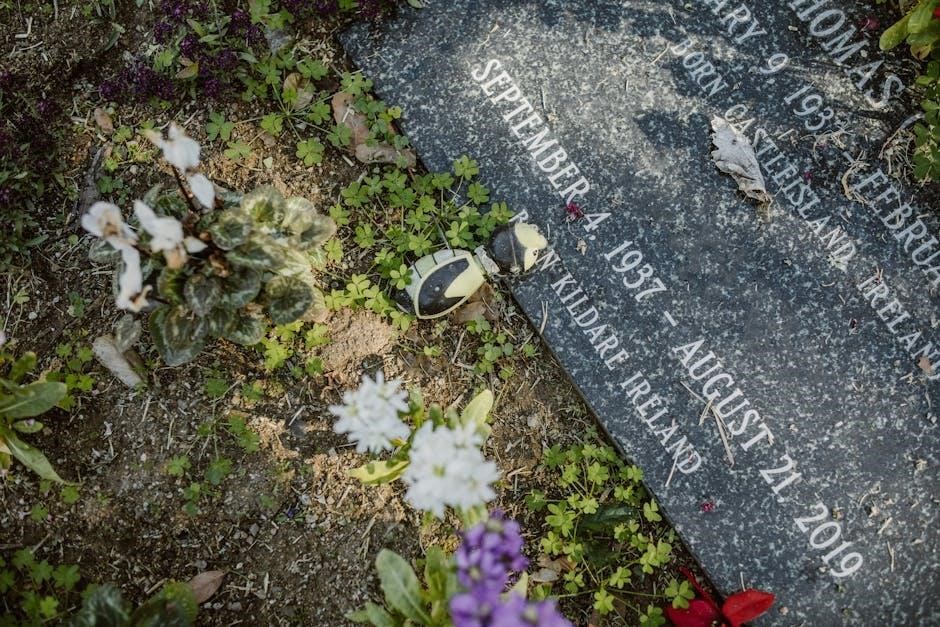
Key Themes
Grief, mental health, single parenthood, and the struggle between revenge and forgiveness are central themes, explored with raw honesty and emotional depth.
Grief and Bereavement
Jessica Waites’ memoir delves into the raw, unfiltered experience of grief following her husband’s sudden death. The book captures the emotional turmoil, shock, and disorientation that accompany bereavement, offering a candid portrayal of navigating a world altered by loss. Waites’ journey through grief is both deeply personal and universally relatable, as she grapples with the fragmented reality of life without her partner. The memoir highlights the complexities of mourning, from the initial numbness to the gradual, painful acceptance, providing a poignant exploration of how grief reshapes identity and purpose.
Mental Health and Wellness
Jessica Waites’ memoir, The Widow’s Guide to Dead Bastards, sheds light on the mental health challenges that accompany widowhood. The book explores the author’s struggle with emotional turmoil, anxiety, and depression following her husband’s death. Waites candidly discusses her journey toward wellness, emphasizing the importance of self-care and seeking support. Her story highlights the complex interplay between grief and mental health, offering a real and relatable account of navigating the psychological landscape of loss. The memoir serves as a testament to resilience, illustrating the difficult yet vital process of healing and finding balance in the face of profound tragedy.
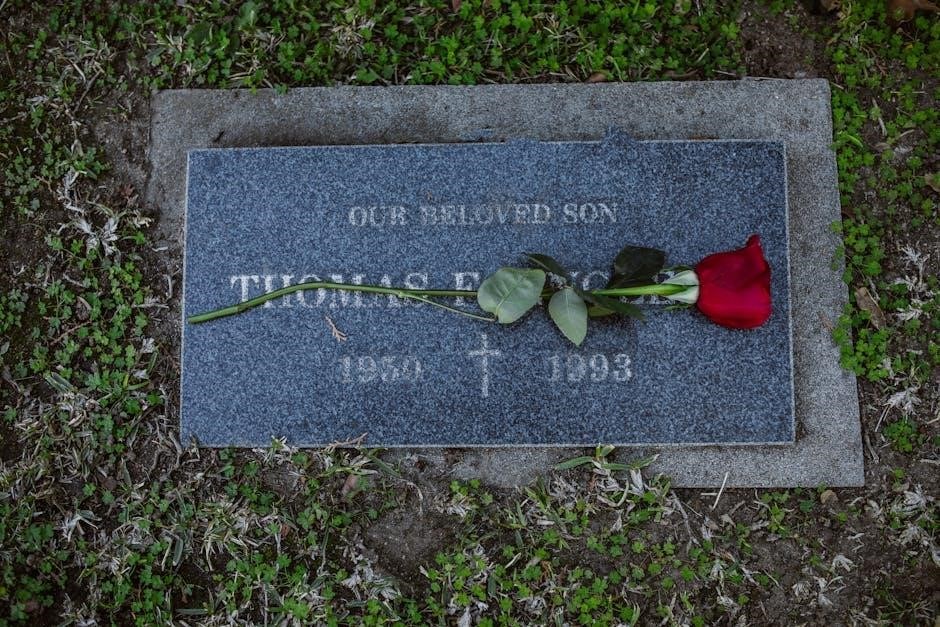
Single Parenthood Challenges
In The Widow’s Guide to Dead Bastards, Jessica Waites delves into the intricate struggles of single parenthood following her husband’s unexpected death. The memoir vividly portrays the dual responsibilities of grieving and raising her children alone, highlighting the emotional and practical challenges she faced. From managing daily routines to navigating the emotional needs of her kids, Waites provides a heartfelt and honest account of her journey. Her story underscores the resilience required to balance personal grief with the demands of parenting, offering a poignant exploration of love, loss, and adaptability in the face of unforeseen circumstances.
Revenge vs. Forgiveness
The Widow’s Guide to Dead Bastards intricately explores Jessica Waites’ internal conflict between seeking revenge and embracing forgiveness after her husband’s sudden death. The memoir captures her emotional turmoil as she grapples with anger and betrayal, oscillating between a desire for retribution and the need to heal. Through her journey, Waites reveals how this struggle shapes her identity and relationships, offering a profound reflection on the complexities of human emotions. Her story provides insight into the cathartic power of forgiveness and the burdens of unresolved vengeance, illuminating a path toward personal liberation and peace.

Personal Reflections
Jessica Waites’ memoir offers a deeply personal exploration of grief, resilience, and self-discovery, providing readers with a candid look into her emotional and psychological transformation.
Emotional Journey of the Widow
Jessica Waites’ memoir vividly captures her emotional journey as a widow, navigating shock, despair, and resilience. Her story oscillates between seeking revenge and embracing forgiveness, reflecting the turmoil of losing a loved one unexpectedly. The memoir delves into her struggles with single parenthood and mental health, offering a raw yet lyrical portrayal of grief. Through her candid narrative, Waites invites readers to witness her transformation from anguish to growth, highlighting the complex interplay between sorrow and strength in the face of unimaginable loss. Her journey is both deeply personal and universally relatable, resonating with anyone who has experienced bereavement.
Lessons Learned and Growth
Jessica Waites’ memoir reveals profound lessons learned through her harrowing experience, emphasizing resilience and self-discovery. Her journey underscores the importance of forgiveness over revenge, showcasing personal growth amidst grief. The book highlights how she navigated single parenthood and mental health challenges, ultimately finding strength in vulnerability. Waites’ story not only chronicles her transformation but also offers readers a roadmap for coping with loss, illustrating that growth can emerge from even the darkest circumstances. Her candor inspires hope, encouraging others to embrace their own paths toward healing and self-discovery. This memoir is a testament to the human spirit’s capacity for renewal.
Societal Impact
The memoir challenges societal stereotypes surrounding widowhood, offering a raw perspective that resonates universally. It fosters empathy and understanding, inspiring systemic change and support for bereaved individuals.
Cultural Impact on Widowhood
The Widow’s Guide to Dead Bastards challenges traditional narratives about widowhood, offering a bold perspective that reshapes cultural perceptions. By candidly exploring grief and resilience, Jessica Waites humanizes the widow’s experience, breaking stereotypes and fostering a more inclusive dialogue. The book’s unflinching honesty encourages cultural shifts, promoting empathy and understanding. It serves as a catalyst for conversations about widowhood, helping to dismantle stigmas and redefine societal expectations. This memoir not only reflects personal struggle but also inspires broader cultural change, making it a significant contribution to contemporary discourse on loss and identity.
Social Stigma and Support Systems
The Widow’s Guide to Dead Bastards sheds light on the social stigma widows often face, revealing how societal expectations can isolate them. Jessica Waites’ memoir vividly portrays the challenges of navigating grief while confronting judgment and misunderstanding. The book also highlights the lack of adequate support systems for widows, particularly single mothers, emphasizing the need for stronger communal networks. Through her journey, Waites underscores the importance of breaking down stigmas and fostering empathy. Her story advocates for a more compassionate society, urging readers to challenge outdated norms and build inclusive support structures for those grieving.
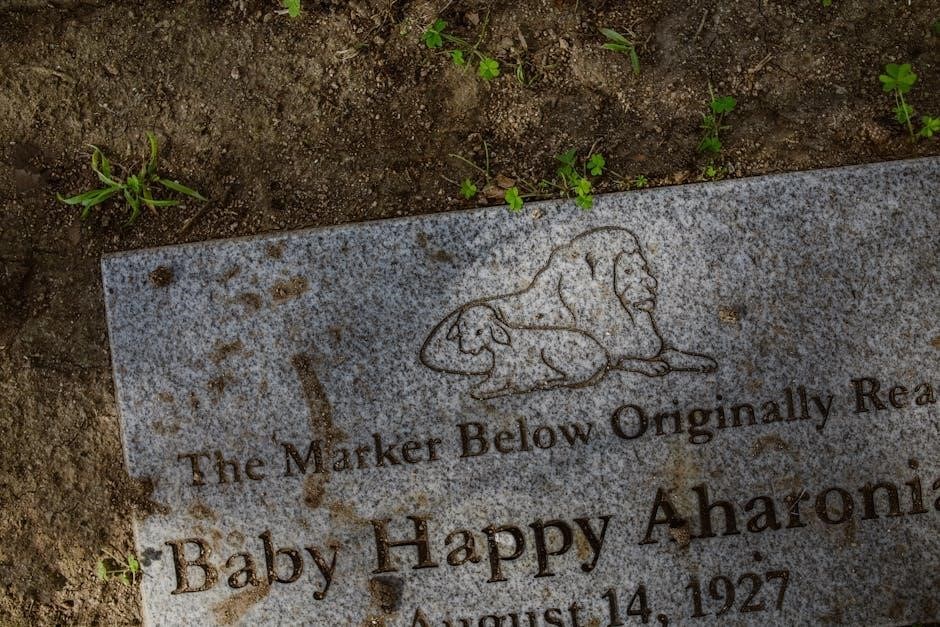
Structure and Style
The Widow’s Guide to Dead Bastards employs a narrative approach, blending lyrical prose with raw honesty, creating a compelling and emotionally resonant reading experience.
Narrative Approach and Flow
The Widow’s Guide to Dead Bastards masterfully balances emotional intensity with a gripping narrative, weaving together themes of grief, revenge, and forgiveness in a fluid, engaging manner.
The author’s use of vivid descriptions and introspective reflections creates a compelling flow, drawing readers into her personal journey of loss and resilience. The narrative seamlessly transitions between moments of raw vulnerability and unexpected beauty, maintaining a magnetic pull that keeps the reader invested. This dynamic storytelling approach ensures the memoir feels both deeply personal and universally relatable, offering a poignant exploration of human resilience and emotional complexity.
Literary Devices Used
Jessica Waites employs a lyrical prose style, blending metaphor and vivid imagery to convey the complexity of grief and resilience in The Widow’s Guide to Dead Bastards.
Her use of juxtaposition, contrasting moments of raw emotion with subtle humor, creates a nuanced narrative; The memoir also incorporates introspective dialogue, allowing readers to witness her internal struggles and growth. Literary critics have noted the effective use of symbolism, particularly in the exploration of revenge and forgiveness, which adds depth to the storytelling. These devices collectively craft a compelling and emotionally resonant read, enhancing the memoir’s thematic richness and reader engagement.
Reception and Reviews
The Widow’s Guide to Dead Bastards has received critical acclaim for its candid portrayal of grief and mental health, described as a “riveting” and “surprisingly beautiful” memoir.
Critical Acclaim and Analysis
The Widow’s Guide to Dead Bastards has garnered significant praise for its unflinching honesty and lyrical prose. Critics highlight Jessica Waites’ ability to balance raw emotion with introspective analysis, creating a narrative that resonates deeply with readers. The memoir’s exploration of grief, mental health, and single parenthood is both poignant and relatable, earning it a reputation as a compelling and thought-provoking read. Reviewers note its unique blend of vulnerability and strength, making it a standout in contemporary memoir literature.
Audience Response and Engagement
Audience Response and Engagement
Readers have deeply connected with The Widow’s Guide to Dead Bastards, praising its relatable portrayal of grief and resilience. The memoir’s candid storytelling has sparked meaningful conversations, resonating particularly with those who have experienced loss. Many appreciate Jessica Waites’ authenticity, finding solace in her journey. The book’s ability to balance heavy themes with moments of hope has fostered a loyal readership, making it a cherished and impactful read for many. Its engaging narrative has also encouraged discussions on mental health and single parenthood, further amplifying its reach and emotional impact.

Comparisons with Other Works
The Widow’s Guide to Dead Bastards shares themes of grief and resilience with other memoirs, yet its unique voice and lyrical prose set it apart, offering a fresh perspective on loss and healing.
Similar Memoirs and Themes
Memoirs like The Year of Magical Thinking by Joan Didion and Wild by Cheryl Strayed explore grief and self-discovery, mirroring The Widow’s Guide to Dead Bastards in their raw emotional depth. These works similarly navigate the complexities of loss, mental health, and personal growth, offering readers relatable journeys through darkness and redemption. By blending vulnerability with resilience, these narratives create a powerful connection with audiences seeking solace and understanding in their own struggles. The themes of single parenthood and the quest for forgiveness also resonate strongly with contemporary memoirs, making this book a standout in its genre.
Genre Comparisons and Influence
The Widow’s Guide to Dead Bastards blends memoir with psychological insight, drawing comparisons to works by Mary Karr and André Aciman. Its fusion of raw emotion and lyrical prose situates it within the literary memoir genre, while its narrative tension echoes elements of psychological thrillers. The book’s influence lies in its ability to redefine grief narratives, offering a fresh perspective on widowhood and resilience. By combining personal storytelling with universal themes, it challenges traditional genre boundaries, inspiring a new wave of memoirs that balance vulnerability with literary depth.
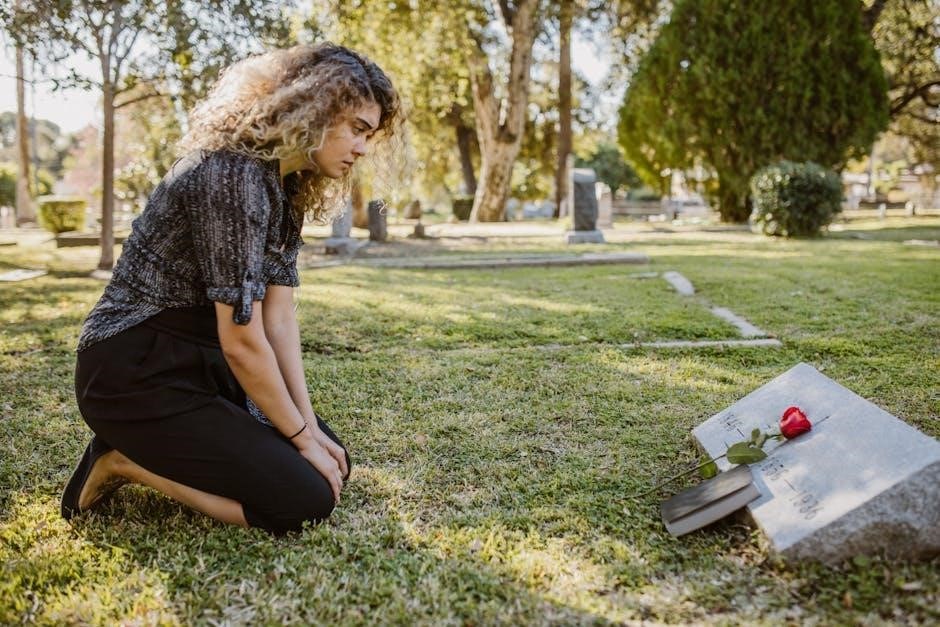
Future Implications
Jessica Waites’ memoir redefines grief narratives, influencing future literature on widowhood and resilience. Its raw storytelling may inspire societal change, fostering empathy and support for bereaved individuals.
Impact on Literary Landscape
Jessica Waites’ memoir, The Widow’s Guide to Dead Bastards, reshapes grief narratives with its lyrical and raw storytelling. By blending personal tragedy with universal themes, it challenges traditional memoir formats, offering a fresh perspective on widowhood. The book’s emotional depth and sincerity create a powerful resonance, potentially inspiring future authors to explore similar themes with unflinching honesty. Its influence may lead to a new wave of candid, emotionally charged literature, bridging the gap between personal and collective experiences of loss and resilience. This shift could redefine how grief is portrayed in modern literature.
Societal Influence and Change
The Widow’s Guide to Dead Bastards sparks crucial conversations about widowhood, mental health, and single parenthood. By addressing these topics with candor, it challenges societal stigma surrounding grief and bereavement. The memoir encourages a more empathetic understanding of widows’ struggles, fostering a cultural shift toward greater support. Its impact may lead to reforms in social support systems, advocating for policies that aid widows and single parents. This narrative has the potential to drive meaningful societal change, promoting a more compassionate and inclusive environment for those navigating loss and rebuilding their lives. Its influence extends beyond literature, offering a blueprint for real-world transformation.
The Widow’s Guide to Dead Bastards offers a poignant exploration of grief, resilience, and growth, leaving readers with a lasting reflection on life’s unpredictability and human strength.
Final Thoughts and Reflections
Jessica Waites’ memoir, The Widow’s Guide to Dead Bastards, leaves readers with a profound reflection on grief, resilience, and the complexities of human emotion. The book masterfully balances pain with resilience, offering a raw yet lyrical account of navigating life’s unpredictability. Through her journey, Waites explores themes of revenge, forgiveness, and single parenthood, providing a deeply personal yet universally relatable story. Her honesty and vulnerability create a connection with readers, inspiring them to confront their own struggles with courage and grace. This memoir is not just a story of loss but a testament to the strength of the human spirit.
Call to Action for Readers
Readers are urged to embrace The Widow’s Guide to Dead Bastards as more than a memoir—it’s a catalyst for reflection and growth. Jessica Waites’ story challenges us to confront grief, mental health, and resilience with honesty. Share this powerful narrative with others navigating similar struggles, sparking conversations about loss and healing. Support initiatives aiding widows and single parents, amplifying the book’s message of hope. Let this story inspire you to embrace vulnerability and find strength in shared experiences, fostering a community of understanding and empathy.